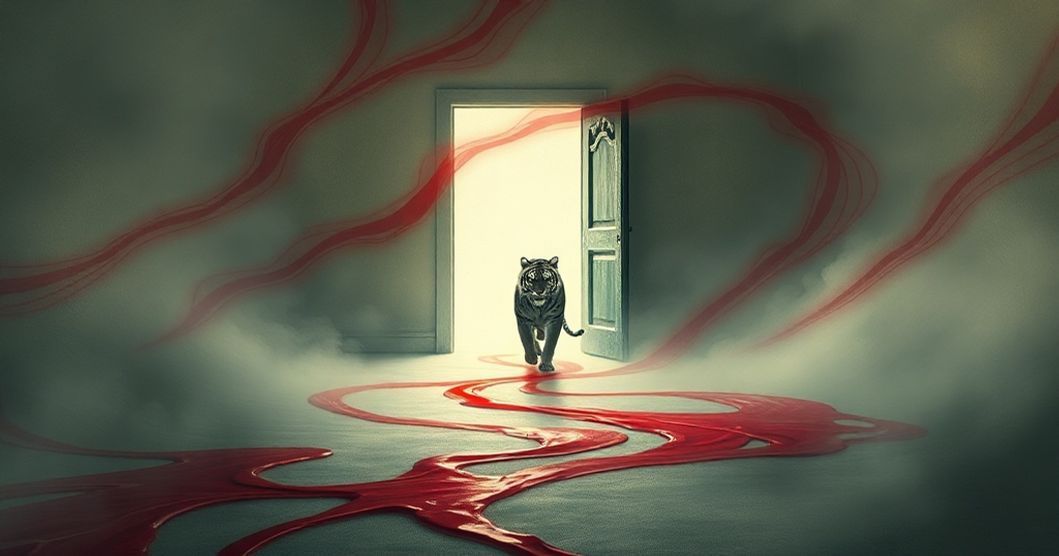Core Symbols: Blood, Tigers, and Doorways in Dreamscape
Blood in dreams is rarely literal; it’s a language of energy and emotion. When you see blood without injury, it often reflects emotional vitality—your inner life is active, even if outwardly calm. In some traditions, blood symbolizes the life force connecting your past, present, and future selves, making it a bridge between conscious and subconscious. A tiger, meanwhile, embodies primal courage and untamed power. Unlike lions (regal and controlled), tigers in dreams lean into raw instinct—they may roar with suppressed anger or stalk with unacknowledged fear. The key is context: a gentle tiger pacing could signal untapped strength, while a snarling one might reflect unprocessed frustration.
Doorways, the third symbol, aren’t just entryways—they’re thresholds. A partially open door might represent a new opportunity, while a closed one could mirror fear of the unknown. In dreamwork, doorways often appear when life is in flux: starting a new job, ending a relationship, or facing a personal truth. The phrase “chasing echoes” suggests these symbols repeat, like a song you can’t stop hearing—your mind is looping through unresolved themes, urging you to listen.
Psychology Lens: How Your Brain Weaves These Symbols
Want a More Personalized Interpretation?
Get your own AI-powered dream analysis tailored specifically to your dream
🔮Try Dream Analysis FreeNeuroscience explains part of this: during REM sleep, your brain processes emotional memories, prioritizing unresolved feelings. If you’ve recently experienced stress—a fight, loss, or unmet expectation—your amygdala (emotion center) might “highlight” these events, manifesting as blood (pain), tiger (anger), and doorways (the need to move forward). Cognitive psychology adds that dreams act as a “narrative editor,” stitching together fragments of your day into symbolic stories.
Jungian psychology offers deeper insight: the tiger as your shadow archetype—the parts of yourself you’ve rejected or feared. The blood? It’s the shadow’s “lifeblood,” demanding integration. If you’ve been suppressing anger or courage, the tiger roars to be seen. Doorways? They’re the “threshold of individuation,” the space between who you are and who you’re becoming. In this view, your dream isn’t a warning but a call to wholeness.
Life Triggers: When These Dreams Emerge
These symbolic echoes often surface during pivotal life moments. A career shift might trigger doorways (new opportunities vs. fear of failure). Unresolved conflict—say, a fight with a sibling—could manifest as blood (emotional wounds) and a tiger (repressed frustration). Trauma, too, leaves echoes: someone who lost a parent might dream of blood (loss of life force) and a tiger (fear of losing again), with doorways symbolizing the need to “step through” grief into healing.
Modern life amplifies this: digital overload, social comparison, or unmet expectations can create inner “echo chambers.” If you’re feeling disconnected from your purpose, the tiger might stalk you as a reminder to reclaim your strength. Blood here becomes a metaphor for vitality drained by burnout, urging you to nourish your emotional core.
What To Do Next: From Dream to Daily Life
Start with short-term reflection: Keep a dream journal, noting details—the color of blood (vibrant red vs. dark crimson), the tiger’s mood (calm vs. aggressive), and the door’s state (open, closed, or ajar). Ask: What emotion was I feeling when I saw these elements? This anchors you in the present moment, separating the dream’s urgency from its symbolic truth.
For medium-term exploration, experiment with confronting the tiger’s energy. If the tiger felt threatening, try mindfulness exercises to sit with discomfort (e.g., a 5-minute “anger meditation”). If blood felt vital, journal about recent moments of passion or creativity—your psyche may be urging you to express that energy. For doorways, create a “threshold ritual”: write a letter to the past, pack a bag for a new adventure, or simply visualize walking through an open door with intention.
Long-term integration means honoring these echoes as guides, not just warnings. Notice recurring patterns in your dreams—they’re your subconscious’s way of saying, “This is what needs your attention.” Over time, these symbols evolve, shifting from fear to empowerment as you heal.
FAQ: Navigating the Nuances
Q: What does it mean if I see blood but no injury in my dream? A: Blood without injury often reflects emotional vitality or unexpressed feelings. It may signal your inner life is active, even if outwardly calm—like a dormant seed sprouting.
Q: Is a tiger in my dream always a sign of danger? A: No—tigers can represent courage or untapped strength. Context matters: a calm tiger might reflect hidden power, while an aggressive one could signal unaddressed frustration.
Q: How do I tell if doorways in dreams are about new opportunities or fear of change? A: Notice the door’s state: open/closed, light/dark. Open doors with light suggest opportunity; closed or dark doors may reflect fear of the unknown. Journaling your feelings during the dream helps clarify.
These symbols aren’t random—they’re your subconscious’s way of speaking. By listening to the echoes of blood, tigers, and doorways, you unlock the courage to face what’s been waiting for you on the other side of the threshold.
